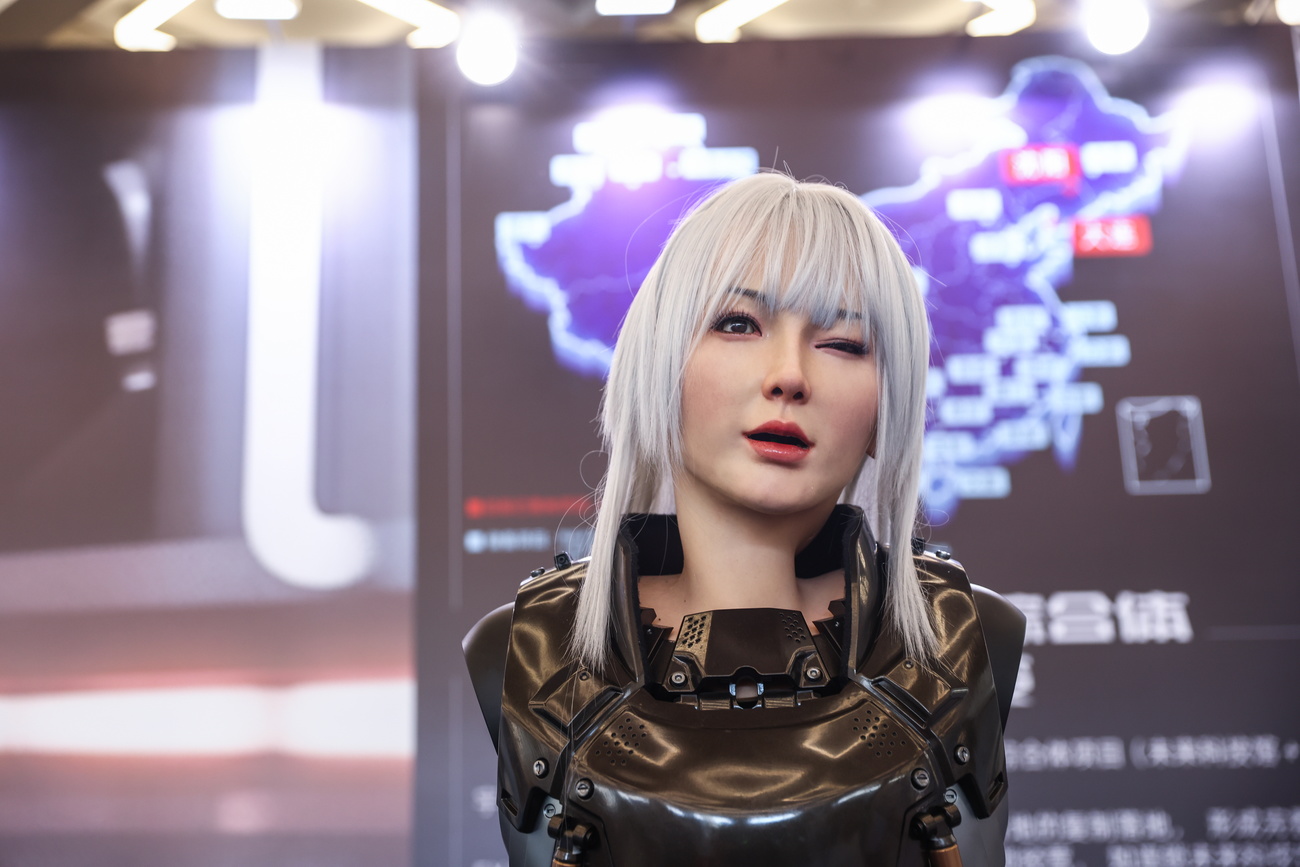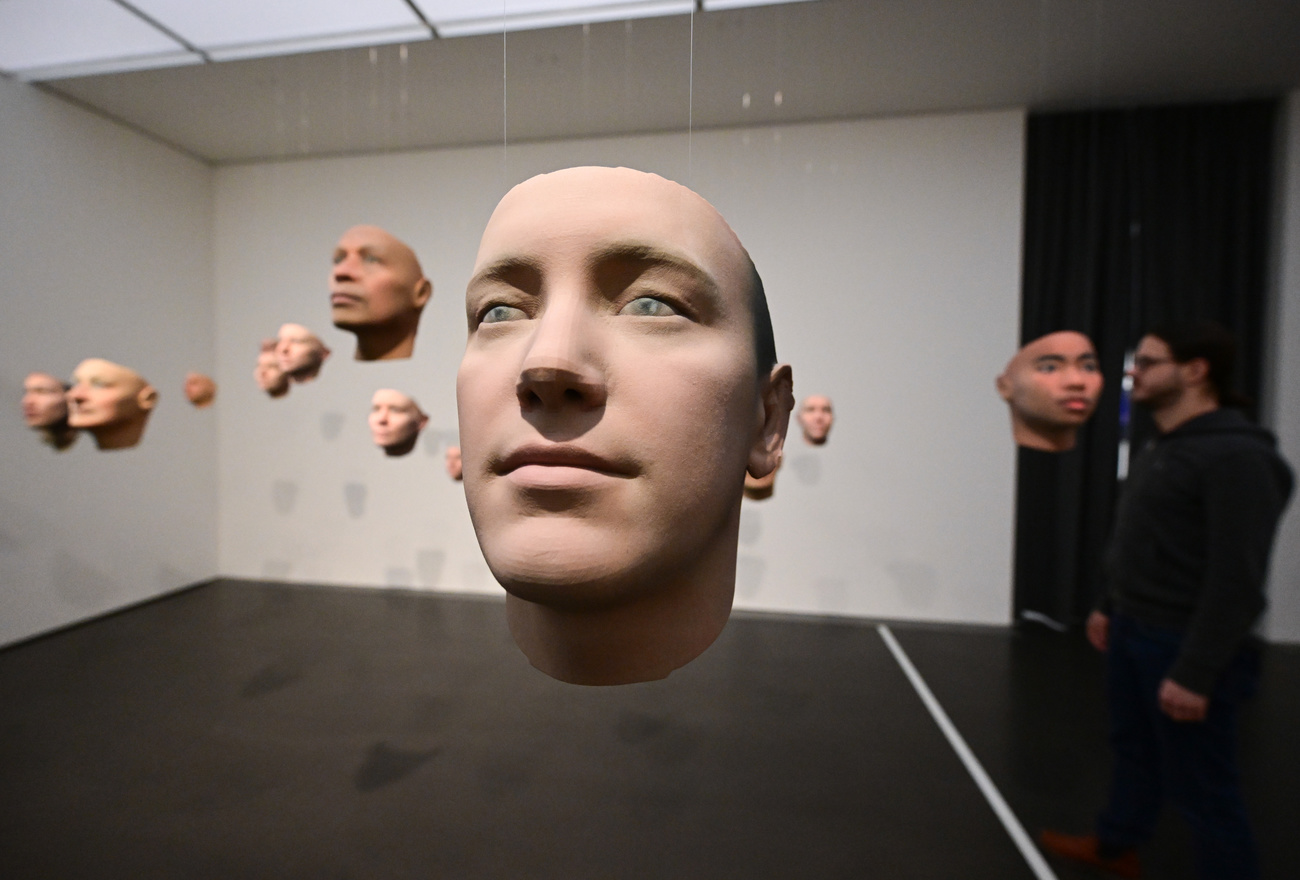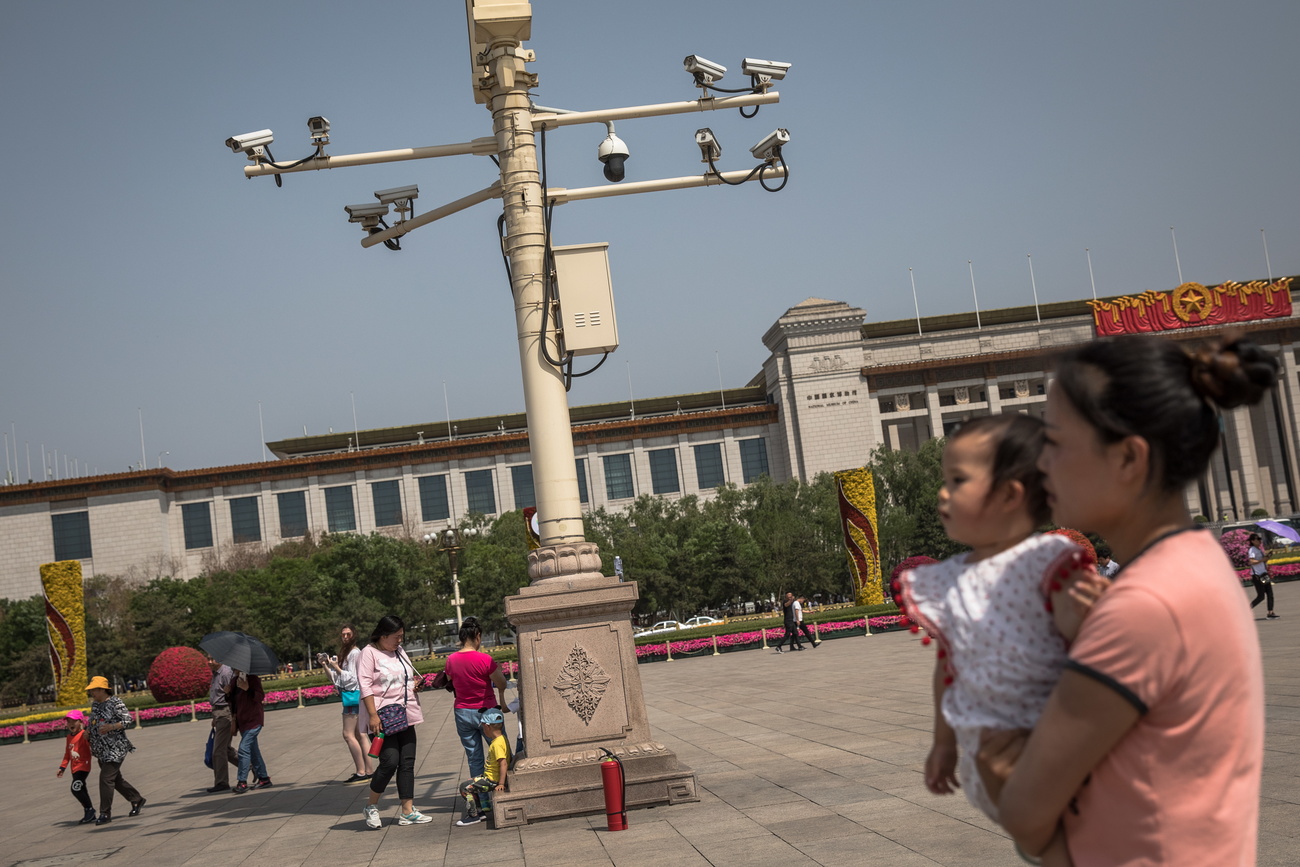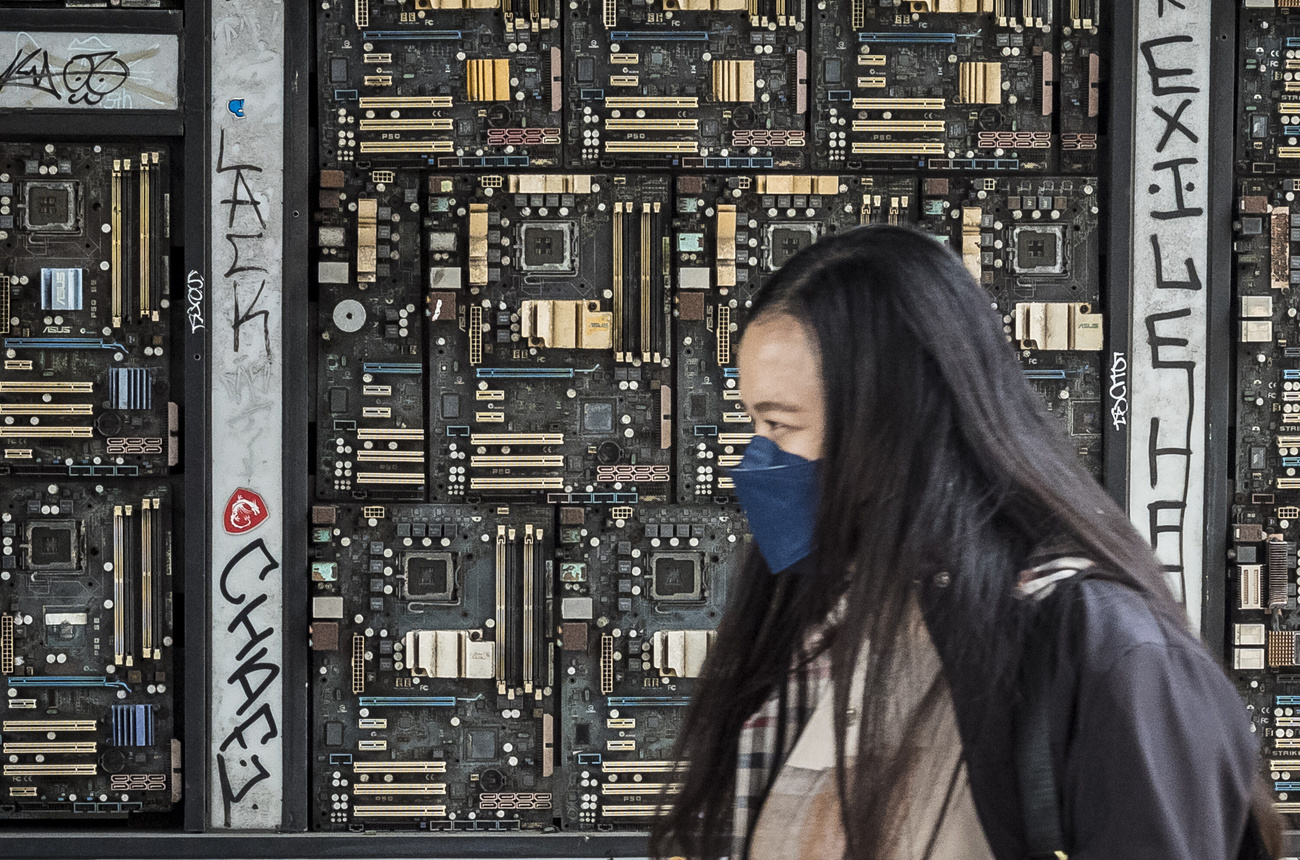Why China’s approach to AI intrigues Switzerland

Beijing's strict rules on the use of artificial intelligence established a first-of-its-kind regulatory system. Now Switzerland is looking with interest at China as it aims to become a bridge between East and West in the global AI race.
From grocery shopping to hospitals with robots among the doctorsExternal link, artificial intelligence (AI) is an integral part of daily life in China.
“When I leave my house in the morning, everything is on my smartphone,” says Philippe Roesle, who has headed Swissnex, the Swiss research and innovation outpost in Shanghai, since 2022. In China, AI-powered facial recognition apps and systems give access to homes, metro stations, and even public toiletsExternal link.
China is not only adopting AI on a large scale but is also challenging the US in the development of advanced systems. The recent launch of the powerful and efficient Chinese generative AI model DeepSeek has called US leadership in the field into question.
Rules around AI give China an edge
China’s system of regulations gives it an advantage in the race to dominate AI, says Bhaskar Chakravorti, a technology expert at the Fletcher School of Tufts University (US).
“China has always focused on regulation to maintain state control,” Chakravorti says. Strict censorship on topics such as minority repression and political dissent extends to AI, ensuring that technology aligns with government priorities. This tight control has also allowed China to outpace the US in setting ethical and regulatory frameworks.
This is important to guide development and make systems safe from misuse, bias, and cyber threats while enhancing reliability. “Strong AI development is not enough to win users’ trust – clear rules are also necessary,” Chakravorti states, noting that even censorship-driven guardrails can create a perception of safety that encourages adoption of new technologies.

More
China-US rivalry over artificial intelligence: what role for Switzerland?
Switzerland has understood well the importance of common rules on AI. The Alpine country wants to leverage its neutrality, its technology and its diplomatic skills to mediate between East and West in the AI race and guarantee global ethical and regulatory standards.
“We need to understand how China thinks,” says Roesle. “Closing the door on Beijing would be unproductive.”
China: AI regulation pioneer
Understanding the Chinese mentality is not so difficult, says Guangyu Qiao-Franco, an assistant professor and expert on AI and China at the Dutch Radboud University: Beijing and the West “share many values” in their approach to AI, including human-centricity, privacy protection and non-discrimination. In 2017, anticipating the European Union (EU), China introduced its first ethical guidelinesExternal link on the responsible use of AI, later consolidated in 2021External link.

More
AI regulations must strike a balance between innovation and safety
These rules require AI systems to be fair, avoid bias and data leaks, and prevent social instability. Beijing has also pioneered the regulation of recommendation algorithmsExternal link and deepfakesExternal link, banning false or misleading content. In 2023, China regulated generative AIExternal link, obliging companies to disclose training data sources before releasing platforms on the market, to ensure state control and prevent abuse.
“China is the only country that has specific rules on algorithms and how they should be used in everyday life,” says Junhua Zhu, a researcher in AI ethics and governance at the University of Turku, Finland.

More
Switzerland in no rush to tame artificial intelligence
In contrast, the US still lacks meaningful AI regulations more than two years after the launch of ChatGPT. The EU’s AI Act, which came into force in 2024, does not require prior scrutiny of AI models like China does. And Switzerland is lagging in establishing a regulatory framework for AI, which should arrive by the end of 2026, according to a recent government announcementExternal link.
“China is leading the way,” says Elisabeth L’Orange, a partner at Deloitte in Hamburg and an expert in generative AI. But the speed with which Beijing has regulated AI should not surprise us: it has to do with its authoritarian system that prioritises control and censorship. “The authorities’ biggest fear is that AI will not adhere to the Chinese Communist Party values,” says L’Orange.
State control of AI benefits China at the expense of ethics
To prevent the spread of narratives that could undermine the Party’s legitimacy, China requires AI-generated content to reflect the “core values of socialism” and bans content inciting separatism or terrorism.
Despite citing privacy in its ethics guidelines, the Chinese government has access to the largest amount of data on its citizens of any country in the world. “There is no data protection like in Europe. It is the Wild West,” L’Orange says. This enables rapid AI development, while many democratic countries face rigid regulatory constraints related to privacy.
China exploits this advantage to dominate the industry and compete with the US, say Jennifer Victoria Scurrell and Tobias Pulver of ETH Zurich’s Centre for Security Studies (CSS). “We have to ask why China insists on rules and ethics when it uses AI for facial recognition everywhere,” Scurrell notes.

AI for collective over individual good
For Qiao-Franco, this is just another stigmatisation of China: like the US and Switzerland, China seeks to balance regulation and innovation to sustain its economic development. “Chinese policy is highly inward-looking, with limited emphasis on competing with the US,” she says.
She finds “frustrating” the stereotypical image of China as a country without ethics where AI is regarded as a mere tool for mass surveillance. In her view, Chinese culture puts collective good over individual freedoms, which is why the population widely accepts AI surveillance. “These technologies are largely perceived as tools for ensuring national security and public stability,” she explains, calling the Chinese system “a democracy that differs from Western models”.
Rongsheng Zhu, a researcher at Tsinghua University in Beijing, also criticises the foreign narrative on Chinese AI and defends China’s strict control over AI systems developed by private companies. This, he says, is how the government protects citizens’ rights.
“If for democracies like the US this means violating the free enterprise, then I prefer the actions of my government,” adds Zhu.
Could Switzerland mediate?
Despite differences in approach and geopolitical tensions, Switzerland considers the dialogue with China on AI ethics and governance “extremely important”, says a Swiss foreign ministry spokeswoman. Talks have already begun: last September, Swissnex organised meetings in Beijing and Shanghai between Swiss and Chinese experts to understand “fundamental differences and commonalities”, says Swissnex’s Roesle.
Shortly afterwards, Swiss diplomats Thomas Schneider and Benedikt Wechsler held talksExternal link with the authorities in Beijing, who are “ready for dialogue” on AI and data governance, cybersecurity and digital infrastructure, according to Switzerland’s foreign ministry. Bern is also in discussions with the United States and is evaluating Geneva’s role as an international hub for digital governance.
Thanks to its neutrality and diplomatic skills, Switzerland could mediate between China and the US on AI governance, says Daniele Gerundino, former assistant secretary general of the Geneva-based International Organisation for Standardisation (ISO). “It can act as a catalyst, promoting the best of both approaches. That has always been its speciality,” he states. Moreover, the fact that Switzerland is not a member of NATO or the EU might help in the eyes of Beijing.
If successful, Switzerland’s efforts could help align AI safety standards and data rules globally, blunting the trend towards regulatory fragmentation between China, the US and the EU.
Doubting Swiss neutrality
But some question Switzerland’s impartiality. For Rongsheng Zhu, Swiss sanctions on Russia have undermined the country’s reputation as a neutral state, revealing an alignment with the US. “Switzerland is no longer credible as a mediator,” says the Chinese researcher.
Pulver of the CSS in Zurich also doubts that Switzerland can maintain a neutral approach and emphasises the country’s commercial dependence on China and the US. Switzerland has signed a privileged free trade agreement with Beijing, while it depends on US chips for AI development. Pulver believes that the new restrictions on US chip exports will force a reckoning for Switzerland.
“Sooner or later, it will have to pick a side,” he says.
What do you think? Join the debate:
Edited by Gabe Bullard and Veronica De Vore/ds

In compliance with the JTI standards
More: SWI swissinfo.ch certified by the Journalism Trust Initiative










You can find an overview of ongoing debates with our journalists here . Please join us!
If you want to start a conversation about a topic raised in this article or want to report factual errors, email us at english@swissinfo.ch.